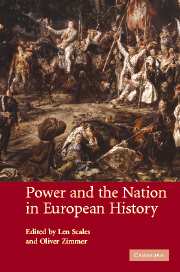Book contents
- Frontmatter
- Contents
- List of contributors
- Introduction
- PART I APPROACHES AND DEBATES
- PART II THE MIDDLE AGES
- PART III ROUTES TO MODERNITY
- PART IV MODERNITY
- 12 Enemies of the Nation? Nobles, foreigners and the constitution of national citizenship in the French Revolution
- 13 Nation, nations and power in Italy, c. 1700–1915
- 14 Political institutions and nationhood in Germany, 1750–1914
- 15 Nation, nationalism and power in Switzerland, c. 1760–1900
- 16 Nation and power in the liberal state: Britain c. 1800–c. 1914
- Index
16 - Nation and power in the liberal state: Britain c. 1800–c. 1914
Britain c. 1800–c. 1914
Published online by Cambridge University Press: 02 December 2009
- Frontmatter
- Contents
- List of contributors
- Introduction
- PART I APPROACHES AND DEBATES
- PART II THE MIDDLE AGES
- PART III ROUTES TO MODERNITY
- PART IV MODERNITY
- 12 Enemies of the Nation? Nobles, foreigners and the constitution of national citizenship in the French Revolution
- 13 Nation, nations and power in Italy, c. 1700–1915
- 14 Political institutions and nationhood in Germany, 1750–1914
- 15 Nation, nationalism and power in Switzerland, c. 1760–1900
- 16 Nation and power in the liberal state: Britain c. 1800–c. 1914
- Index
Summary
The ancient historiographical tradition that held that the British state was different from European norms has been challenged in the past generation by Gramscian and Foucauldian perspectives, which have tended to suggest that power constructed the nation in Britain just as in the rest of Europe, only not so palpably through the agency of the state, but rather through a cultural ‘hegemony’ or a ‘master narrative’ or a discursive rather than institutional ‘governmentality’. In this chapter I want to try to reinstate the gist of the traditional argument, while responding to and – to a certain extent – incorporating these newer perspectives. Liberalism did involve a distinctive configuration of power, one in which power was more widely diffused throughout society, and not concentrated in the state. It also entailed, partly as a consequence, a distinctive pattern of national belonging, one which was not so attached to or generated by the state. Especially before the First World War – though also enduringly – nation and state remained more distinct than in many other modern polities, to the extent that national belonging could be explicitly defined as independence from (or even opposition to) the state.
Historians often argue that the British state did not engage in the strenuous nation-building characteristic of other European polities because it did not need to. There is a good deal of truth in this, but only in certain ways, about which we must be precise.
- Type
- Chapter
- Information
- Power and the Nation in European History , pp. 354 - 369Publisher: Cambridge University PressPrint publication year: 2005
- 1
- Cited by



